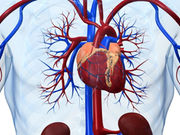Model uses age, biomarkers, clinical variables to predict cardiovascular death
WEDNESDAY, Aug. 9, 2017 (HealthDay News) — A biomarker-based model provides a new tool for the prediction of cardiovascular (CV) death in patients with stable coronary heart disease (CHD), according to a study published in the Aug. 15 issue of the Journal of the American College of Cardiology.
Daniel Lindholm, M.D., Ph.D., from Uppsala University in Sweden, and colleagues evaluated and compared the prognostic value of biomarkers and clinical variables to develop a prediction model in patients with stable CHD.
The researchers found that the three most important biomarkers were N-terminal pro-B-type natriuretic peptide (NT-proBNP), high-sensitivity cardiac troponin T (hs-cTnT), and low-density lipoprotein cholesterol (LDL-C). However, NT-proBNP and hs-cTnT had greater prognostic value than any other biomarker or clinical variable. The final prediction model included age (A), biomarkers (B; NT-proBNP, hs-cTnT, and LDL-C), and clinical variables (C; smoking, diabetes mellitus, and peripheral arterial disease). The “ABC-CHD” model had high discriminatory ability for CV death in both the deviation and validation cohorts.
“This model provided a robust tool for the prediction of CV death in patients with stable CHD,” the authors write. “As it is based on a small number of readily available biomarkers and clinical factors, it can be widely employed to complement clinical assessment and guide management based on CV risk.”
Several authors disclosed financial ties to pharmaceutical and diagnostic companies, including GlaxoSmithKline and Roche Diagnostics, both of which funded the trial.
Copyright © 2017 HealthDay. All rights reserved.








